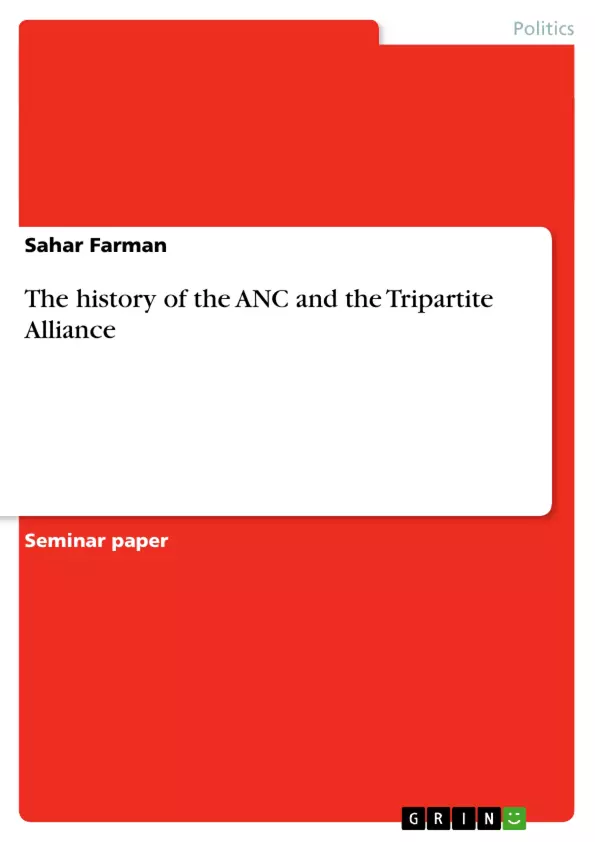For more than 40 years the South African National Party (NP) was in power governing the country with a racist system of segregation. For the black and colored majority of the country it was a time of fear, harassment, persecution and injustice. Throughout the years the global community was aware of the political situation in South Africa. The major issue of this paper is to examine the positions and campaigns of different countries of the global community toward the situation in South Africa, especially focusing on political and economic reactions from the sixties until 1989.
First of all a brief overview will be given on the economics of the apartheid system in order to create an awareness of the general conditions whereupon the strategic importance of South Africa for the global community will be issued. In order to mediate a sufficient background knowledge sanctions will be defined and different sanction scenarios that were possible will be discussed. Subsequently a chronology of sanctions towards South Africa will be given in order to then focus on The Federal Republic of Germany (FRG), its interests in and reactions towards the Republic of South Africa (RSA). Due to the limitation of this paper Germany will be taken as an example for the policies of many Western states. However, several countries will be briefly discussed throughout the paper.
While analyzing the different positions during the apartheid era two major questions will be guiding through the paper:
1. How did the countries react?
2. What was/could have been the interest behind the reaction?
Finally by having answered these questions a conclusion can be drawn as to whether the global community used all the existing possibilities to help bring apartheid to an end.
Inhaltsverzeichnis (Table of Contents)
- Introduction
- The economics of the apartheid regime
- The strategic importance of South Africa
- The importance of the Cape Route
- South Africa's mineral wealth
- The strategic importance of South Africa
- Sanctions
- Definition and distinction
- The legal situation of the international context
- A chronology of sanctions to the RSA
- Evaluation of the sanction imposed on the RSA
- The Federal Republic of Germany and the RSA
- Germany's foreign policy towards South Africa
- Economic relations
- Conclusion
Zielsetzung und Themenschwerpunkte (Objectives and Key Themes)
This paper examines the international community's response to the apartheid regime in South Africa, particularly focusing on political and economic reactions from the 1960s until 1989. The paper aims to analyze the positions and campaigns of different countries towards the situation in South Africa, highlighting Germany's role as an example for many Western states.- The economic significance of the apartheid regime in South Africa for the global community.
- The effectiveness and limitations of international sanctions in response to apartheid.
- The Federal Republic of Germany's foreign policy and economic relations with South Africa during the apartheid era.
- The motivations behind the various responses of international actors towards South Africa.
- The extent to which the global community utilized all available resources to bring an end to apartheid.
Zusammenfassung der Kapitel (Chapter Summaries)
- Introduction: This chapter provides an overview of the apartheid regime in South Africa, highlighting its impact on the black and colored majority. It introduces the paper's objectives, focusing on the international community's responses to apartheid.
- The economics of the apartheid regime: This chapter examines the economic structure of the apartheid regime, emphasizing South Africa's strategic importance due to its mineral wealth and the Cape Route. It analyzes the role of foreign investment and the composition of South Africa's imports and exports.
- Sanctions: This chapter defines and distinguishes various types of sanctions and explores the legal framework of the international context regarding sanctions. It provides a chronology of sanctions imposed on South Africa and evaluates their effectiveness.
- The Federal Republic of Germany and the RSA: This chapter focuses on Germany's foreign policy and economic relations with South Africa during the apartheid era. It analyzes Germany's role as an example for the policies of many Western states.
Schlüsselwörter (Keywords)
This paper focuses on the international response to the apartheid regime in South Africa. Key terms include apartheid, international sanctions, foreign policy, economic relations, strategic importance, mineral wealth, the Cape Route, and the Federal Republic of Germany. The analysis explores the motivations behind different actors' responses and assesses the effectiveness of the global community's efforts to end apartheid.Frequently Asked Questions
What was the international response to Apartheid in South Africa?
The international community responded with various political and economic sanctions, although the intensity and motivation varied between countries.
Why was South Africa strategically important during the Apartheid era?
Due to its vast mineral wealth and its location along the Cape Route, which was a vital sea lane for international trade.
Did sanctions effectively help end Apartheid?
The paper evaluates the effectiveness of sanctions, noting they put pressure on the regime but were often undermined by the strategic and economic interests of Western states.
What was West Germany's (FRG) position on South Africa?
Germany maintained strong economic ties with South Africa, and its foreign policy was often torn between condemning Apartheid and protecting its industrial interests.
What was the role of the ANC during this time?
The African National Congress (ANC) led the resistance against Apartheid and sought international support to isolate the racist National Party government.
- Quote paper
- Sahar Farman (Author), 2007, The history of the ANC and the Tripartite Alliance, Munich, GRIN Verlag, https://www.grin.com/document/114223



